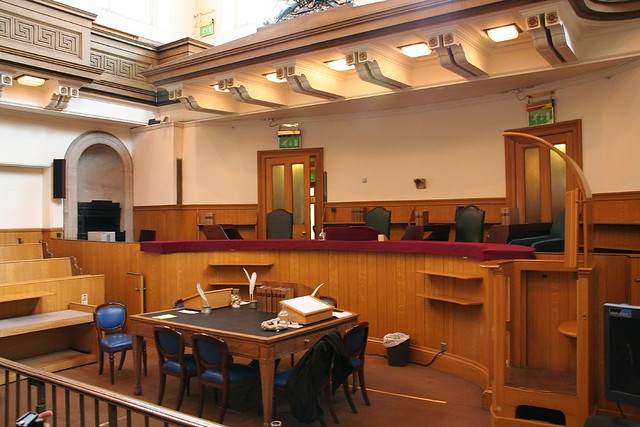|
Nominated BEST TRUE-CRIME PODCAST at British Podcast Awards 2018, The Telegraph's Top Five True-Crime Podcasts, The Guardian's Podcast of the Week and iTunes Top 25. Subscribe via iTunes, Spotify, Acast, Stitcher and all podcast platforms.
How can you plead in court?
You may think, when a judge asks “how do you plead”, that as the defendant, you have just two options – guilty or not guilty? But you don’t. There are several options. The three main ones are: Guilty: by admitting your guilt you waive any rights and the trial can progress to sentencing without any evidence, witnesses or even the victim being called. Most lawyers would advise against a guilty plea unless it benefits yourself by offering a more favourable sentence. That said, you may be able to withdraw a guilty plea, at any time during the trial, as long as sentencing has not begun. Not Guilty: by admitting your innocence – even if you are guilty – this gives your legal defence time to examine and evaluate any new evidence which the prosecution may wish to present, and to mount a defence against it, so this is often the most common plea in criminal court. No Contest: by neither admitting your innocence or guilt with regards to the charges, the trial must proceed as if you have pleaded “not guilty”, but this is rarely an option lawyers suggest taking as (by pleading neither way) it can come with some serious consequences. And you can also, say nothing. Even in court, (although it is not advised by your lawyer) you do not have to plead at all. In fact, unless summoned, as a defendant you can choose to remain silent, and even fail to appear in court, but in most cases, silence or failing to appear will result in a guilty plea. I spend a lot of time in court, watching cases, and it’s amazing the amount of time a little scrote is brought before the judge, and when asked how he pleads, he shrugs and say “bovvered”. Baffling. But there are other pleas you can make: The Alford Plea: this is where the defendant proclaims their innocence to the charges but acknowledge that the evidence is sufficient to convict them should the case go to jury trial. Famous case of Henry Alford charged with first degree murder, pleaded innocent, even though he had confessed to a witness that he had committed the act, and yet had he pleaded guilty, he may have escaped the death penalty. A Conditional Plea: this is where the defendant pleads guilty to the offense, but specifically reserves the right to appeal certain aspects of the charges (eg: if the evidence was illegally obtained). And there’s the Insanity Plea: this is where the defendant admits their guilt of the charges but claims they were not responsible for their actions by reason of insanity or a lack of mental capacity. For an insanity plea to be accepted, mental health professionals on both sides will be called to give evidence on whether they agree that the defendant was “not of sound mind at the time of the crime” and did not understand the difference between “right” and “wrong”, commonly known as the McNaughton Rules, but only the jury can decide if he/she was guilty of the crime. The Insanity Plea is accepted in the UK, Canada, Australia and almost all states in the USA, accepted Idaho, Kansas, Montana and Utah, but Kansas does allow a guilty but insane verdict by a jury. Where-as in the Nordic countries; insanity is not allowed as a legal defence, therefore in Sweden (the perpetrator is fully accountable for their crimes), in Denmark & Norway (those declared insane are not punished for their crimes but are committed for psychological and mental treatment), and in Finland, any punishment can only be administered if the accused is compos mentis (of sound mind).
If you found this interesting? Check out the Mini Mile episodes of the Murder Mile UK True-Crime Podcast, or click on the link below to listen to an episode.
Michael J Buchanan-Dunne is a writer, crime historian, podcaster and tour-guide who runs Murder Mile Walks, a guided tour of Soho’s most notorious murder cases, hailed as “one of the top ten curious, quirky, unusual and different things to do in London”, nominated "one of the best true-crime podcasts at the British Podcast Awards 2018", and featuring 12 murderers, including 3 serial killers, across 15 locations, totaling 50 deaths, over just a one mile walk
0 Comments
Your comment will be posted after it is approved.
Leave a Reply. |
AuthorMichael J Buchanan-Dunne is a crime writer, podcaster of Murder Mile UK True Crime and creator of true-crime TV series. Archives
July 2024
Subscribe to the Murder Mile true-crime podcast
Categories
All
Note: This blog contains only licence-free images or photos shot by myself in compliance with UK & EU copyright laws. If any image breaches these laws, blame Google Images.
|




